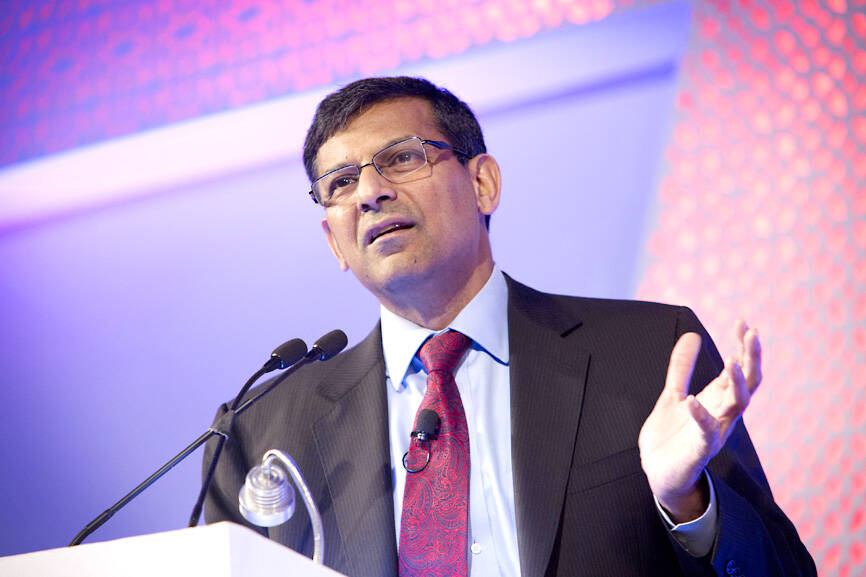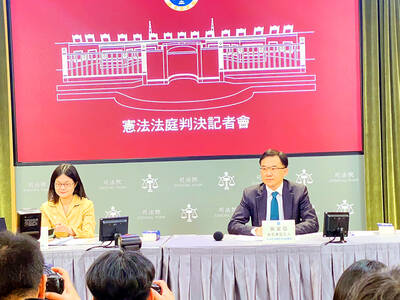The world should prepare for possible war in the Taiwan Strait, should China attack Taiwan, a former Reserve Bank of India governor said in a podcast over the weekend.
“I do think we should be prepared for the possibility that China may act on Taiwan and the Western world will push back. That is a possibility,” Raghuram Rajan, a professor of finance at the University of Chicago Booth School of Business, said in an interview on the podcast Figuring Out With Raj Shamani, released on Saturday.
Although Rajan said he hoped a war was not imminent, he urged caution on China.

Photo: Bloomberg
The Chinese he engages with say their country would not start a war, “but who knows?” he said.
“The problem with more authoritarian countries is — it’s all in the mind of the leader,” which is unpredictable, he said.
The world order is changing with the rise of China and India, and possibly Brazil, Rajan said, adding that China, the US and the EU might be India’s biggest competitors in the new world order.
Other fast-growing nations of rising importance include Indonesia, Mexico and Nigeria, he said.
However, the UN is too weak to establish peace, so “a stronger organization for global peace” is needed, he said.
Regarding India’s development, he said the country should focus on “opening up and engaging with the world,” as well as creating a friendly image to avoid being seen as an “ugly superpower.”
China’s “wolf warrior” behavior, which aims to create fear in other countries, has provoked adverse reactions from nations, such as tariffs imposed on Chinese goods and international disputes, Rajan said.
China has become increasingly authoritarian, which stifles innovation and creativity, and, in turn, drags down its economic growth, he said.
India should avoid acting like China on the world stage or it would drive away investment, trade and talent, he said.
India should also use its soft power to present itself as “a microcosm of global civilization” that is diverse, open and inclusive, he said.

The US government has signed defense cooperation agreements with Japan and the Philippines to boost the deterrence capabilities of countries in the first island chain, a report by the National Security Bureau (NSB) showed. The main countries on the first island chain include the two nations and Taiwan. The bureau is to present the report at a meeting of the legislature’s Foreign Affairs and National Defense Committee tomorrow. The US military has deployed Typhon missile systems to Japan’s Yamaguchi Prefecture and Zambales province in the Philippines during their joint military exercises. It has also installed NMESIS anti-ship systems in Japan’s Okinawa

TRAGEDY STRIKES TAIPEI: The suspect died after falling off a building after he threw smoke grenades into Taipei Main Station and went on a killing spree in Zhongshan A 27-year-old suspect allegedly threw smoke grenades in Taipei Main Station and then proceeded to Zhongshan MRT Station in a random killing spree that resulted in the death of the suspect and two other civilians, and seven injured, including one in critical condition, as of press time last night. The suspect, identified as a man surnamed Chang Wen (張文), allegedly began the attack at Taipei Main Station, the Taipei Fire Department said, adding that it received a report at 5:24pm that smoke grenades had been thrown in the station. One man in his 50s was rushed to hospital after a cardiac arrest

ON ALERT: Taiwan’s partners would issue warnings if China attempted to use Interpol to target Taiwanese, and the global body has mechanisms to prevent it, an official said China has stationed two to four people specializing in Taiwan affairs at its embassies in several democratic countries to monitor and harass Taiwanese, actions that the host nations would not tolerate, National Security Bureau (NSB) Director-General Tsai Ming-yen (蔡明彥) said yesterday. Tsai made the comments at a meeting of the legislature’s Foreign Affairs and National Defense Committee, which asked him and Minister of National Defense Wellington Koo (顧立雄) to report on potential conflicts in the Taiwan Strait and military preparedness. Democratic Progressive Party (DPP) Legislator Michelle Lin (林楚茵) expressed concern that Beijing has posted personnel from China’s Taiwan Affairs Office to its

‘ILLEGAL RULING’: The KMT and the TPP slammed the Constitutional Court judgement, saying it contravened the law and was trying to clear the way for a ‘green dictatorship’ The Constitutional Court yesterday ruled that amendments to the Constitutional Court Procedure Act (憲法訴訟法) passed by the Legislative Yuan last year are unconstitutional, as they contravene due legislative process and separation of powers. The Legislative Yuan on Dec. 20 last year passed amendments stipulating that no fewer than 10 grand justices must take part in deliberations of the Constitutional Court, and at least nine grand justices must agree to declare a law unconstitutional. The Executive Yuan on Jan. 2 requested that lawmakers reconsider the bill, but the Legislative Yuan, under a combined majority of Chinese Nationalist Party (KMT) and Taiwan People’s Party